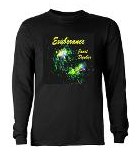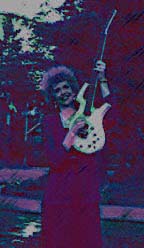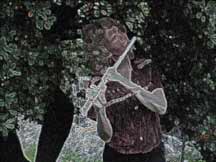
Composer Janet Dunbar, The New Elegant Simplicity. Symphonic and Orchestral Music.
About the Composer
American-born composer Dr. Janet Dunbar has the gift of melody. Pioneer of The New Elegant Simplicity, Dunbar reaches out to audiences with:
- Memorable singable melody.
- Straightforward tonality that avoids dissonance.
- Countermelodies that are enjoyable to play and to hear, rivaling principal melodies in their appeal to the ear.
- Rhythmic excitement and drive.
- Elements of both repetition and surprise.
- Intentional avoidance of cumbersome, overly complex chaotic filler, which interferes with the communication of crystal clear melodic ideas.
- Dynamic and timbral contrasts.
- Mastery of tension and release in formal design.
Dunbar's answer to The New Complexity, The New Elegant Simplicity, fuses modern popular music styles with the classical tradition, attracting listeners back to the concert hall again and again. Although Dunbar synthesizes many styles, the music remains highly melodic with strong classical influences, yet distinctly modern, in its rhythmic inventiveness and metric ingenuity.
From an early age, Dunbar was drawn to music: singing at the age of two and studying piano, guitar, and flute shortly thereafter. Attracted to many types of music, the young composer played in the orchestra and band, sang in choirs, and looked up to Beethoven as a childhood idol. As Dunbar came of age in the New York area, she naturally gravitated towards the folk, jazz, and rock band scene, through the lure of improvisation. By that time, Dunbar's facility at melodic invention was unmistakable.
The youthful composer continued to hone her compositional skills and contrapuntal technique, working with Tikey Zes at San Jose State University. Fiercely guarding her unique style, Dunbar pursued further advanced studies with such notables as Chris Chafe, Jonathan Harvey, and Wayne Peterson. Dunbar was very active at Stanford's CCRMA (Center for Computer Research in Music and Acoustics), where her algorithmic compositions and computer music with a jazz / world music influence were performed frequently. At CCRMA concerts, Dunbar's works stood out as highly melodic and appealing to audiences. While highly intellectualized styles were within her capacity, her penchant for melody evidenced itself even in her computer-generated, algorithmic compositions. Excursions into world music motifs, jazz harmonies, musique concrete, computer music and skill at text setting culminated in the 25-minute, ten part tour de force, Song of the Sea, recorded on the CD, Spirit Journey. More recently, the composer has focused on elaborating the ideals of The New Elegant Simplicity and producing acoustic works in this more mature style.
Determined to achieve excellence in her chosen field, Dunbar earned a Doctor of Musical Arts in Composition from Stanford University and a Master of Arts in Music from San Jose State University. For the compositions and performances on the CD, Spirit Journey, Dunbar was inducted into the World Hall of Fame of American Singers and Entertainers, 1999-2004 by World Art Celebrities Journal. The composer also won a Hedy King Robinson Prize for Music Theory in 2006. A generous teacher, Dunbar was recognized in Who's Who Among America's Teachers and Educators in 2007. The composer now divides her time between directing Amberlight Conservatory in the Dallas-Fort Worth Metroplex, attending frequent premieres of her works, and her intense compositional activities.
Recent performances and multimedia events include the following:- Double premiere of Episodes and Emergence for Orchestra by the State Symphony Orchestra of Ukraine in Kiev, with Swiss conductor and jazz saxophonist Silvio Wyler at the podium, January 23, 2011.
- World premiere of Déjà Vu for Orchestra by the Kharkov Philharmonic Orchestra, directed by London conductor and jazz saxophonist, Stephen Ellery, March 25, 2010.
- Double premiere of two works for orchestra, Vision and Epiphany, by the Dnipropetrovsk Symphony Orchestra under the direction of Dr. Leo Walz, June 11, 2009, Dnipropetrovsk, Ukraine.
- World premiere of Spring Fever Triptych for two guitars at Guitars Galore! April 25, 2009 in Austin, TX by Dunbar and Holmes Guitar Duo.
- Recuerdos de Segovia for solo guitar performed March 13, 2009 at CMS South Central Conference at Oklahoma University in Norman, OK by Aaron Vasquez.
- Song of the Sea for Soprano, Performance Poet and CD (DMA Final Project in ten movements, approximate duration 28 minutes) performed by Janet Dunbar, voice, Richard Holmes, percussion on April 10, 1999 in the Fifth International New Music Festival, Mesa College, San Diego, CA.
- Collaborative musico-poetic works with Jacqueline Thurston at Alea II and CCRMA concerts, Campbell Recital Hall, Stanford University, 1995-1998.
- Visual Cymbals Exhibition, South Bay Women's Caucus for Art.
- Ouroborous, an installation of sculpture, poetry and music, at San Jose State University, October, 1995





